California State University, Sacramento
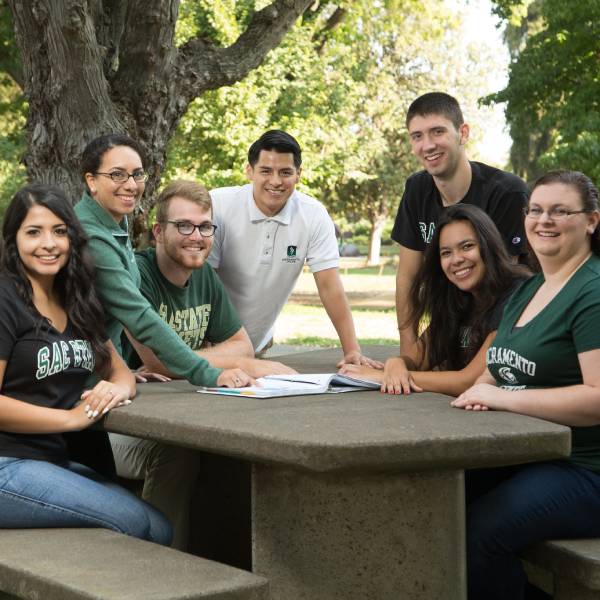
The Transfer Peer Coach Program at Sacramento State is designed to help community college students effectively navigate the transfer process and build connection with the University. The program consists of Transfer Peer Coaches (TPCs) who are currently enrolled Sac State students who have transferred to Sacramento State after earning an Associate Degree for Transfer (ADT) from a local California Community College.
The TPCs are cross trained on admission requirements and academic advising and partner with Admission & Outreach Counselors on outreach activities at local service area community colleges. They provide direct support for community college transfer students. TPCs work with prospective students to inform them of the advantages of the ADT and connect them to admission counseling, academic advising and other student support resources. They also serve on student panels, provide workshops and work one-on-one with prospective students.
The TPC program is part of the campus-wide initiative call Through in Two which is designed to increase the number of ADT transfer students who graduate in two years or less. Transfer Students who participated in the TPC program had to achieve specific milestones and were provided a small scholarship ($500).
Transfer students who participated in the Through in Two program graduated at an 80% rate in two years. Transfer students who were not in the TPC program, but did earn an ADT graduated in two years at a 52% rate. While 41% of transfer students not in the TPC program who transferred without an ADT graduated in two years.
Click here to learn more about the Sacramento State’s transfer programs.
City University of New York (CUNY)
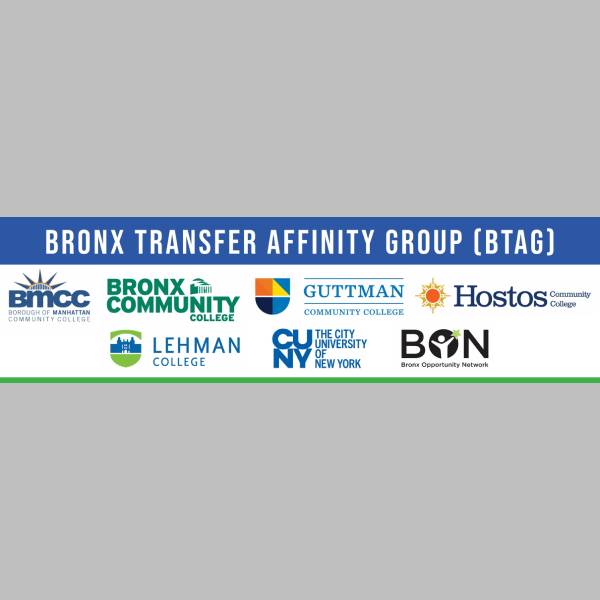
The Bronx Transfer Affinity Group (BTAG) was created in 2018 by Lehman College and Bronx, Hostos, and Guttman Community Colleges. The Borough of Manhattan Community College joined in 2020. BTAG’s goals include creating a graduation habit at each of the colleges, developing a culture of transfer, and reducing barriers to transfer student success. The Bronx Opportunity Network, an umbrella organization of community-based organizations dedicated to working with students to ensure successful transitions from high school to college and from the Associate to the Bachelor’s degree, is the newest member.
BTAG has launched several initiatives to facilitate the seamless transfer of students. Credit for prior learning is optimized via articulation and guaranteed admission agreements. Course equivalencies have been reviewed and updated across all of the colleges and can now be accessed online by faculty, staff, and students. A pre-transfer advisor from Lehman advises students at the community colleges on the transfer process and the optimal electives to take, while emphasizing associate degree completion prior to transfer. Transfer advising worksheets have been developed for programs with high rates of transfer. Curriculum alignment workshops have been held for faculty in the STEM disciplines. Professional development activities have continued during this period of remote learning, with a series of “Transfer Tuesday” seminars/workshops focused on advising technologies, career counseling, student engagement, and other topics relevant to transfer student success.
All of these initiatives have contributed to establishing valuable relationships across the institutions, which has been critical to BTAG’s enduring success.
Click here to learn more about the BTAG.
Florida International University
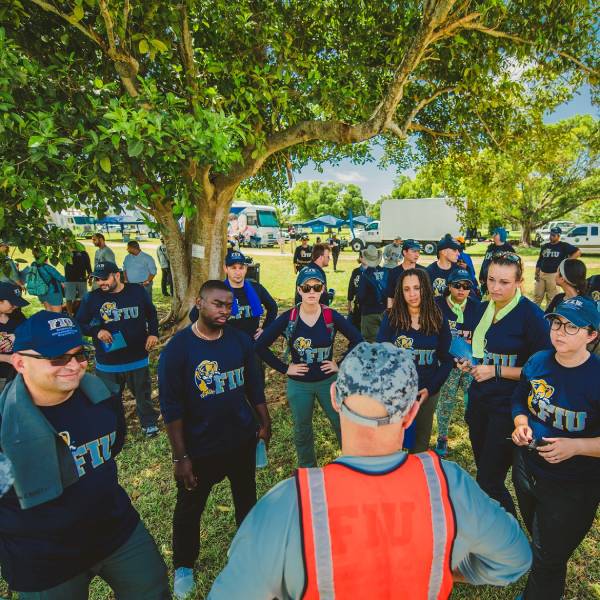
Florida International University (FIU) supports the 2nd largest transfer enrollment in the nation in a state with a comprehensive articulation model and strong transfer outcomes. And, while this model is conducive to student mobility, the university recognizes that many students do not transfer, and for those who do, it can be an uphill climb to complete within expected time and credits to degree. FIU builds on Florida’s articulation framework with evidence-based transfer affirming and transfer receptive approaches to further impact student outcomes.
FIU Connect4Success (C4S), a transfer pathway that serves thousands of underrepresented students, is where transfer affirming work happens. Together with its partners, FIU upholds students’ transfer goals and assert their commitment to helping them meet those goals, maintaining their 4-year identity. C4S offers guaranteed admission to FIU with the AA degree; pre-transfer advising by FIU Bridge Advisors housed at partner colleges, and issuance of the FIU student ID card. The university also reimagined STEM and Humanities pathways to include developing students’ identity to their discipline.
FIU’s transfer receptive lens considers students’ onboarding journey with a focus on transparency and timeliness around how credits transfer. For decision-making and course planning, FIUs Transfer Equivalency Database includes over 80,000 transfer rules; these are confirmed at admission with a personalized Transfer Credit Report. To reinforce enrollment momentum, FIU includes transfer students in a financial aid leveraging model and offers micro-scholarships and completion grants. The university also offers just-in-time peer engagement and support during the first term. And, to meet the unique needs of adult learners, it introduced portfolio-based Prior Learning Assessment in several degree programs, including Disaster Management.
These, and other interventions, have improved AA Transfer-In rates (83%), completion rates (55% in 2 years, 76% in 3 years for full-time transfers), and the percentage of transfer students graduating without excess credits (82%). Of these efforts, FIU President, Mark Rosenberg said, “they speak to FIUs founding identity to serve the unique needs of transfer students. Working with the ACE Task Force made us to think more critically about what it means to meet those needs today; expanding Credit for Prior Learning is one of those ways.”
Click here to learn more about FIU’s transfer pathways.

Since its launch in the fall of 2018, ADVANCE, a partnership between George Mason University (Mason) and Northern Virginia Community College (NOVA), has welcomed more than 2,200 students from diverse backgrounds: 60% are non-White; 61% are from low-income families; and 48% are the first in their families to go to college.
ADVANCE offers more than 85 structured curricular pathways leaving no question of program requirements. This ensures that all courses count towards students’ degrees, and that they persist at higher rates. Thirty six percent of students enter the program with no prior credits and are able to complete their degrees on time if they stay on track.
Success coaches guide learners throughout their journey from NOVA to Mason, and scholarship opportunities are available for qualified students. All ADVANCE students receive a Mason ID when they join the program, giving them unprecedented access to resources such as athletics, health, well-being and career services, even while they take classes at NOVA.
Adeline Vo describes her ADVANCE experience as “complete peace of mind.” “The only problem I need to focus on is going to work and getting the grades. All the white noise in between isn’t an issue as much anymore. That should be how it is.”
Four students have already graduated, including Erica Koprowski who has been working full-time as a human resources administrator while taking classes at Mason. Of her success coach, she shared: “I felt much more comfortable with the transition because I knew she had my back.”
Click here to learn more about the ADVANCE partnership.
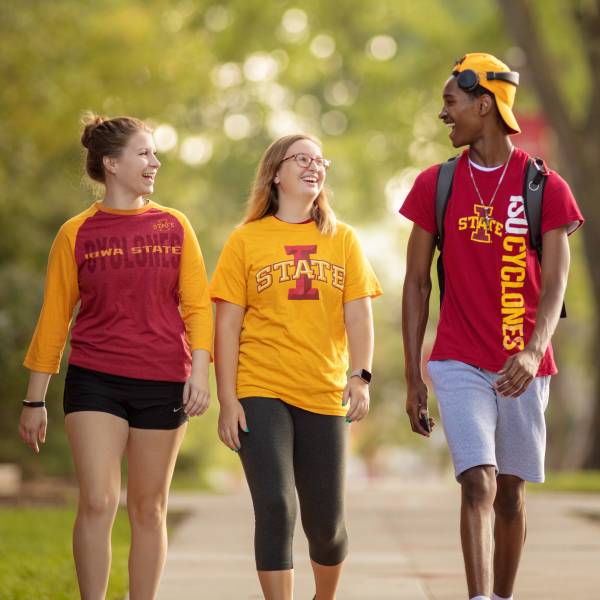
Iowa State University’s Admissions Partnership Program is the centerpiece of the university’s longstanding commitment to the success of transfer students from Iowa’s community colleges. Participating students benefit in multiple ways. They are paired with an Iowa State academic advisor during their community college years, helping them take the right courses — in harmony with well-established articulation agreements with every Iowa community college — to ensure a seamless transition to Iowa State. They receive personal mentoring on degree planning to prepare a path to timely graduation.
Students are guaranteed admission to Iowa State, provided program requirements are met. Other benefits include: a free transcript exchange; real-time audit information so students always know how their credits will transfer; an early invitation to orientation; access to libraries, learning communities, career exploration opportunities, clubs and recreational facilities; discount prices for athletic and cultural events; and an Iowa State email account and ID card. Once they are enrolled and on campus, an impactful part of their success is participation in learning communities. Iowa State has 53 learning community options for transfer students.
Last fall, 44% of transfer students participated in a learning community. The average one-year retention is 3.5% higher for transfer students in learning communities than those who don’t participate. The overall impact of Iowa State’s transfer student program can be seen in the one-year retention rate for 2019 state transfer students — a record 87.1% — and the four-year graduation rate that has risen to 70.5%.
Click here to learn more about Iowa State’s Admissions Partnership Program.

In 2007 the Montana University System (MUS) launched the common course numbering (CCN) project aligning the course rubric and numbering system for all colleges and universities across the MUS. This provided transparency and predictability for students and families considering higher education options especially for those choosing to begin their college career at a local, less expensive 2-year institution and then transfer to a 4-year university for their baccalaureate degree.
Ten years later in 2017 a Montana State University task force recognized that, while academic planning was vastly improved thanks to CCN, many structural barriers remained for students who enrolled at multiple campuses during their undergraduate career. As a result, the Seamless-MSU interface and protocols were launched in 2018.
The Seamless MSU interface allows a student at any MSU affiliated campus to complete a form indicating their enrollment intentions, which then launches a “behind the scenes” workflow through which the enrollment experts on the various campuses collaborate to facilitate the student’s request. Students may choose to transfer, attend two schools simultaneously, or attend as a visitor at one school and return to their home campus the following semester. Upon the submission of their request ALL downstream administrative operations are tracked via workflow; academic file sharing including immunization, transcripts, consortium agreements, registration and even reverse transfer back to the home institution are hands free from the student perspective.
Over 1,000 students have transferred between the MSU campuses using the Seamless MSU interface. Complaints are down and cross-campus collaboration is the new normal.
Click here to learn more about the Seamless MSU interface.
The Pennsylvania State University
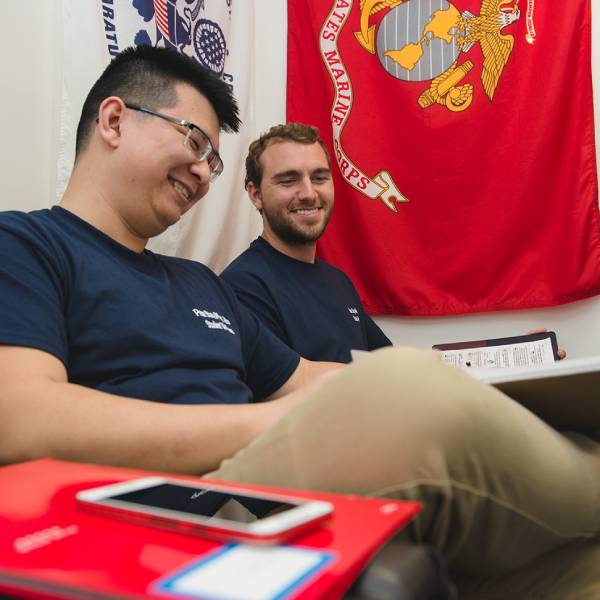
Military service members and veterans looking to attend Penn State can now use an online tool to see how their experiences in the military can translate into credits toward a Penn State degree. For veterans and active military, this means they can search the Transfer Credit Tool to find out how their military educational experiences may gain them Penn State credit instead of going through a lengthier transcript review process.
Typically, when a student wishes to have an experience from a prior institution assessed for Penn State credit, they must submit syllabi and other materials to the Undergraduate Admissions Office to begin the process of having the experience evaluated to see how it aligns with the Penn State curriculum. Service members and veterans now won’t have to go through this process for their military experience because the reviews have already been completed by Penn State faculty. These prospective students only have to submit their military transcripts. For experiences not yet reviewed, Penn State will manage the review with no additional action required by students.
Over the course of the last year, Penn State has evaluated for credit 1,188 Army experiences, 1,031 from the Navy, 177 from Coast Guard, 287 from the Marine Corps and 13 from the Department of Defense. The Air Force is tracked as the Community College of the Air Force.
Penn State already awards a significant number of credits every year for military experience, and the new, more streamlined process will push these numbers even higher.
Click here to learn more about Penn State’s outreach to veterans and active duty service members.

Portland State University (PSU) welcomes more transfer students than any college in Oregon. Close to 60% of its undergraduate students are transfer students. PSU is committed to developing strong partnerships with our regional community colleges partners, specifically with Portland Community College (PCC). 40% of transfer students at PSU transfer from PCC, and around 23% of all Community College to Oregon Public University transfer students, transfer from PCC to PSU. The critical scale of the partnership prompted the presidents of PSU and PCC to charge a collaborative committee- the Joint Committee for the Transfer Experience Improvement- to strategically develop equitable transfer pathways. This joint partnership has provided an opportunity for both institutions to navigate support for transfer students through the disruption of the global pandemic such as working on enhanced co-admission and co-enrollment processes and career pathways.
In February 2020, PSU officially opened a Transfer & Returning Student Resource Center (TRSRC) as a direct result of PSU listening to students who identified a need for specialized support for transfer students. The TRSRC provides coordinated support for establishing effective articulation agreements, transfer advising guides, academic and career advising to incoming transfer and returning adult students, assistance in accessing resources, as well as workshops and events. In just one year, over 800 students have attended TRSC events, all of which have been virtual due to the pandemic.
In addition to the promotion of transfer advising guides and effective articulation agreements, PSU offers multiple opportunities for students to obtain Credit for Prior Learning (CPL). This practice provides a significant opportunity to recognize the learning of our returning adult students.
Click here to learn more about PSU’s Credit for Prior Learning.

SUNY Polytechnic Institute (SUNY Poly) is proud of its various innovative transfer opportunities for students who are studying at a number of New York State community colleges.
Transfer students benefit from dual enrollment, general, and program-specific articulation agreements with schools throughout New York State, which provide a direct roadmap from associate to bachelor’s degree and beyond. Not only do these agreements enable a seamless credit transfer process for students, but SUNY Poly transfer counselors are also able to create and foster relationships with potential transfer students at the very beginning of their college career.
In addition to unique agreements with two-year schools, SUNY Poly also offers a Path to Poly program to first-year students who were denied admission for the fall semester. Students in this program will be admitted to a community college with conditional acceptance to SUNY Poly, allowing transfer counselors the opportunity to provide guidance and resources to the program participants that will prepare them for a smooth transition to SUNY Poly upon admission.
The support and guidance that transfer students receive at SUNY Poly allow them to thrive on campus and many are very active within the campus community, holding student government leadership positions, participating in student clubs, and competing on athletic teams. SUNY Poly’s outstanding work with transfer students was recently recognized by the Phi Theta Kappa Honor Society when it was named as one of only 150 colleges and universities in the country on the 2021 Transfer Honor Roll.
Click here to learn more about SUNY Poly’s transfer programs.
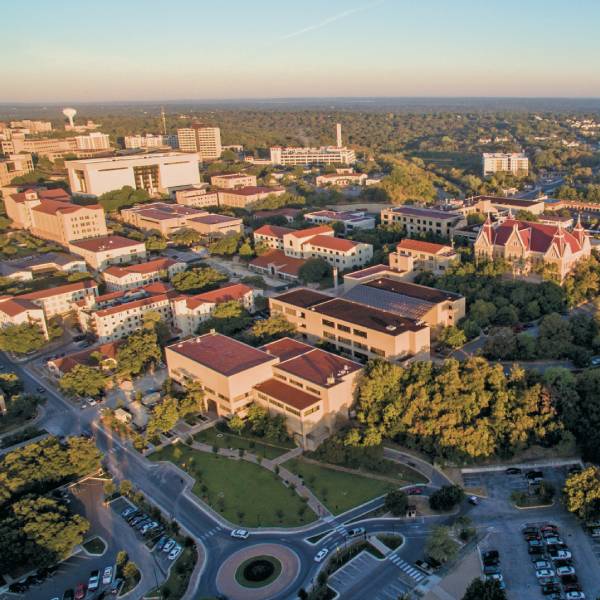
Students transfer colleges for many reasons. Some change majors and transfer to a school that better suits their new degree path. Others start at a two-year college before transferring to finish their degree at a four-year university. Thousands of Texas students transfer schools every year. Being “transfer-friendly” is more than a catchphrase; it is an institutional commitment to make the assimilation process responsive to new transfers.
At Texas State, 37 percent (12,354) of the fall 2020 undergraduate enrollment were transfer students. Transfer students came from 450 different institutions representing 36 U.S. states and territories. Specific student success projects include:
- 2020 Dana Center transfer alliance grant – Austin Community College and Texas State created a 90-day plan to improve transfer success. Targeted to 13 transfer majors, curriculum alignment, and faculty-to-faculty discussions.
- 2). Texas State and Austin Community College were the only two Texas institutions selected to receive an Equity Transfer Initiative grant that begins in February 2021. This American Association of Community Colleges grant provides coaching and support for two years to improve transferability.
- https://news.txstate.edu/inside-txst/2021/equity-transfer-initiative.html
- 3). Texas State developed an MOU partnership with Community Foundations to support low-income transfers with affordable housing.
- 4). The university formed a partnership with ReUp Education to recruit stop-outs back to complete their bachelor’s degree.
To support the State of Texas TX60x30 goal, Texas State actively recruits stop-outs to come back and complete their bachelor’s degree. This spring, the university enrolled 147 former students who stopped-out for 1.5 years or longer.
Texas State University has been awarded a $1.5 million reskilling grant to help up to 1,000 former students with some college credit return to school and complete their degrees. Texas State received the pass-through grant from the United States Department of Education’s Education Stabilization Fund Program via the Governor’s Emergency Education Relief (GEER) Fund. Reskilling grants to institutions will support displaced Texas workers who need to reskill or upskill to get back into the workforce and Texas students who have previously stopped out of higher education institutions without completing a postsecondary credential.
The university is an active supporter of the 60 SCH Texas Transfer Framework. The initiative will build on the existing Texas policies and will support student and institutional flexibility.
Texas State is committed to providing clear transfer pathway guides that include Texas common course numbering for all lower-division courses. These transfer guides are updated annually for all 99 bachelor’s programs.
In the last three years, Texas State has led all Texas public universities in awarding 14,425 degrees to at-risk students. At-risk definition:
a) Includes students who received a Pell Grant.
b) Graduated with a GED.
c) When they first entered college, they were 20 years or older
d) started as a part-time student taking fewer than 12 hours,
e) or had an SAT/ACT score less than the national average.
Click here to learn more about Texas State University’s transfer programs.
University of California Riverside
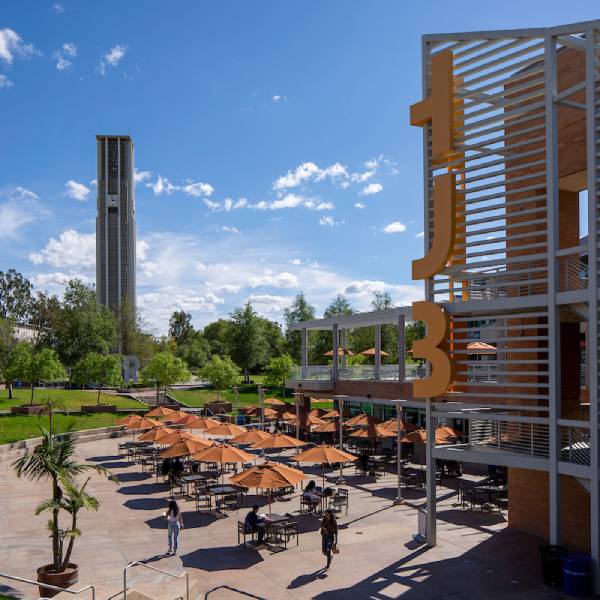
An innovative collaboration among UC Riverside; California State University, San Bernardino; and Chaffey College is expanding the support of transfer students in the rapidly growing Inland Empire region in Southern California. It’s an ongoing challenge ensuring that prospective transfer students remain in the admissions pipeline as they plan to transition to another institution, especially during key milestone in the process – specifically the Transfer Application Update and final transcript deadlines.
Under this expanded partnership, UC Riverside identifies and notifies Chaffey College about students who have initiated but not completed the Transfer Application Update. Chaffey College communicates directly with these students, helps them to understand the urgency of the timelines, and provide direct interventions when needed to support the students completing their applications.
These interventions allow college and university officials the opportunity to identify unexpected circumstances that might be hindering the application process – and to collaborate with students to offer solutions. At the conclusion of the transfer application process, which occurs in the summer, UC Riverside again notifies Chaffey College about incoming students who have not submitted their final transcripts. Chaffey College then provides these transcripts, at their expense of any of its students who have made the commitment to transfer to UC Riverside.
This partnership ensures that missed deadlines or missing documentation do not prohibit qualified students from continuing their undergraduate student journey at UC Riverside.
Click here to learn more about UC Riverside applications.
University of California Santa Cruz

Cultivamos Excelencia is a partnership between San Jose City College (SJCC) and the University of California (UC) Santa Cruz designed to address barriers to transfer access, retention, and graduation through three high impact activities. Cross-enrollment offers UC Santa Cruz courses on-site at SJCC. Through experiences in the classroom, cross-enrollment fosters SJCC students’ academic confidence, preparation with research, and increases students’ interest to transfer to a UC. Peer mentoring provides holistic transfer advising pre- and post-transfer.
Family Day/Dia de la Familia invites SJCC students and their families for a full-day bilingual program at UC Santa Cruz aimed at promoting the incorporation of family in the student’s academic journey as a tool to preserve cultural values and include families in the transfer process. The partnership focuses on students’ pre-transfer experience and increasing the enrollment of students of color and low-income students at UC Santa Cruz.
Through Cultivamos Excelencia, UCSC increased transfer rates from SJCC, a regional community college that has low transfer rates to UCs but enrolls a high concentration of students of color and low-income students with significant academic potential. The university also created opportunities for graduate student professional development in the areas of curriculum design, culturally relevant pedagogy, teaching, and community college student experiences through higher education. Most importantly, campuses work together. UCSC engages in brave dialogue about race in education, develop asset-based pedagogies in working with students, and introduce new ways of structuring campus policies and practices that aim to achieve racial parity in community college transfer student outcomes.
Learn more about the Clutivamos Excelencia partnership.

The University of Central Florida (UCF) is one of the leading transfer institutions in the nation, largely due to the unique DirectConnect to UCF (DC) program. Currently, in its 16th year, DirectConnect to UCF is a partnership-driven, college access program formed between UCF and six Florida College System state colleges founded on the principles of access, choice, transition, flexibility, academic support and guaranteed pathways for progression and completion.
Prospective DC students are provided a UCF success coach who is embedded as a staff member at the state college to help navigate their career and academic plan, and to assist with student services, admissions, financial aid, and other transfer matters. DirectConnect to UCF increases access to high-quality bachelor’s degrees to students who might not otherwise attend a four-year university. Since 2006, UCF has awarded more than 56,900 bachelor’s degrees through this program. More than 33% (6400+) of UCF’s newly enrolled undergraduate students in 2019-2020 entered through DC.
Over 55% of the newly enrolled DC undergraduates represented minority populations compared to the 48% overall newly enrolled undergraduate minority population. Hispanic/Latinx newly enrolled DC population was more than 34% compared to the 27% overall newly enrolled undergraduate Hispanic/Latinx population. African American newly enrolled DC population was more than 11% compared to the 8% overall newly enrolled undergraduate African American population. Also, more than 52% of newly enrolled DC undergraduates were Pell eligible compared to the 30% overall newly enrolled Pell eligible undergraduates. First-generation college students constituted 24% of the newly enrolled DC undergraduate population compared to the 15% of overall newly enrolled undergraduate students. By helping more central Florida residents earn degrees, UCF is improving the social mobility and critical workforce needs of the region.
Click here to learn more about the UCF DirectConnect program.

In 2011, the University of Colorado Denver (CU Denver) and the Colorado Community College System (CCCS) piloted the state’s first conditional admit program: Admissions Promise. Under Admissions Promise, incoming students at select CCCS colleges could declare major-specific academic pathways to CU Denver. Spring 2020 brought a re-imagining of this program, rebranded as the Bridge to Bachelor’s Degree (BTBD), expanded across all 13 CCCS community colleges and all CU Denver academic pathways, with a transfer scholarship. The revision incorporated comprehensive data sharing throughout a student’s community college journey, allowing CU Denver to track the student’s progress and calculate future transfer enrollment with more confidence.
In tandem with the launch of BTBD, CU Denver and CCCS launched the CU Denver: Guaranteed Admissions partnership. Under this agreement, CCCS students are guaranteed admission into CU Denver upon completion of their associate’s degree, regardless of whether they’ve declared a pathway. This initiative, the first of its kind in Colorado, extends data communication and accountability between CCCS and CU Denver by cross-sharing semesterly student records.
Bridge to Bachelor’s Degree enables students to declare CU Denver as their transfer institution of choice at the start of their collegiate journey; Guaranteed Admission’s supports students’ continued education at CU Denver after their community college degree, thus meeting students where they are along critical points during their academic careers. The strengthened agreements widen the door to post-secondary stackable degree attainment.
Click here to learn more about the CU Denver transfer partnerships.
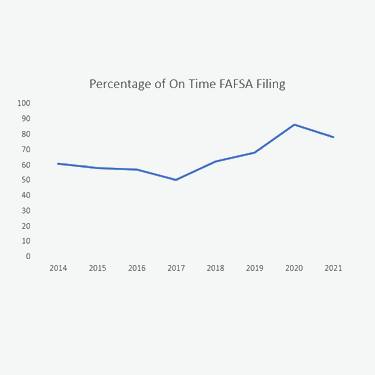
UMaine uses an on-time FAFSA filing date when creating financial aid awards. Students meeting the on-time date are considered for all the types of aid they may be eligible for, including institutional aid. Students filing late are at a disadvantage, especially regarding institutional funds, and usually receive a less robust financial aid package. For many years, March 1st has been the FAFSA filing date for all new and continuing students at UMaine.
Data for UMaine transfers entering in September of 2017 and 2018 revealed that a significant number did not file their FAFSA on time. Many transfers had not even filed a UMaine admission application by March 1st and were unaware of UMaine’s critical on-time date. Students transferring from community colleges lacked experience with a FAFSA on-time filing date or were used to one that was significantly later in the year than March 1st.
To allow more new transfer students to file their FAFSA on time, UMaine moved the on-time FAFSA filing date for new transfers to June 1st starting with transfers first enrolling in September of 2019. The results were spectacular: for September of 2019, 86% of the new transfers filing a FAFSA filed on time and only 14% filed late; compared to September 2018 when only 68% of the new transfers filing a FAFSA filed on time and 32% were late. The trend continued for September 2020 despite the pandemic—with 78% filing on time and only 22% filing late.
Click here to learn more about UMaine’s FAFSA initiatiive.
University of Massachusetts Amherst
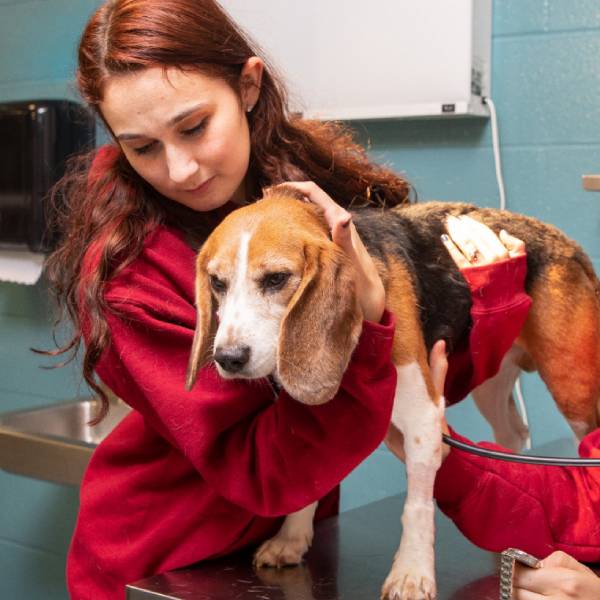
Recent closures of small, tuition-dependent private colleges in Massachusetts have meant that the state’s public universities need to provide transfer pathways for these students. This is a particular challenge when students are pursuing specialized degrees, such as the BS in Veterinary Technology at the former Mount Ida College in Newton.
When the University of Massachusetts Amherst acquired the Mount Ida College campus in 2018, the university assumed responsibility for about 130 Vet Tech students. These students entered UMass as transfers, some of their faculty were hired, interim approvals were obtained, and residence halls, dining, and a purpose-built vet tech teaching facility on the campus were all kept in operation. As this teach-out phase winds down, over 100 former Mount Ida College students have received UMass Amherst degrees and another 25 remain enrolled.
Recognizing that vet tech degree programs are common at other land-grant universities and that veterinary technologists are crucial to the state’s veterinary clinics and its large biotech research sector, UMass obtained approval to offer an accredited Vet Tech program as a major within the century-old Department of Veterinary and Animal Science. The Fall 2020 entering class included the first cohort of “home-grown” Vet Tech majors.
Now, UMass Amherst is once again being asked to step up and provide a transfer pathway for students at a Massachusetts private college that may be closing, Becker College in Worcester. The university has developed a near-perfect mapping of their vet tech, animal science, and equine studies curricula to ensure that these students will complete their UMass Amherst degrees as quickly as possible.
Click here to learn more about the Vet Tech Program.
University of Minnesota, Twin Cities

In January 2018, the University of Minnesota, Twin Cities implemented a new electronic process for transfer credit evaluation, replacing a previous paper based process. Prior to implementing this process, students navigated multiple processes for transfer credit evaluation depending on the department reviewing.
These paper based processes resulted in students struggling to know how their credits transferred into the University, which impacted their ability to register for appropriate courses. Now, anyone can submit transfer courses (domestic, system campus and international) through the use of an online form. The system allows for over 200 academic department reviewers to receive course syllabi and additional information as needed to make course equivalency decisions. Submitters are notified of the decision, and students’ academic records are updated in a timely manner. In addition, all transfer course equivalency decisions are publicized through Transferology.com.
Since 2018, over 8,700 courses have been evaluated through this electronic system. The median turn-around time for a course decision (from when a course is submitted for review to when a decision is made) is six days. This is an extreme improvement from the prior process which could have kept a student waiting months for a decision. The workflow system allows us to track evaluation requests and proactively review new courses for equivalency, prior to a student submitting a course for review. Prospective and current students are able to plan their degree progression more accurately and efficiently, knowing how their courses transfer into our university.
University of North Carolina Charlotte
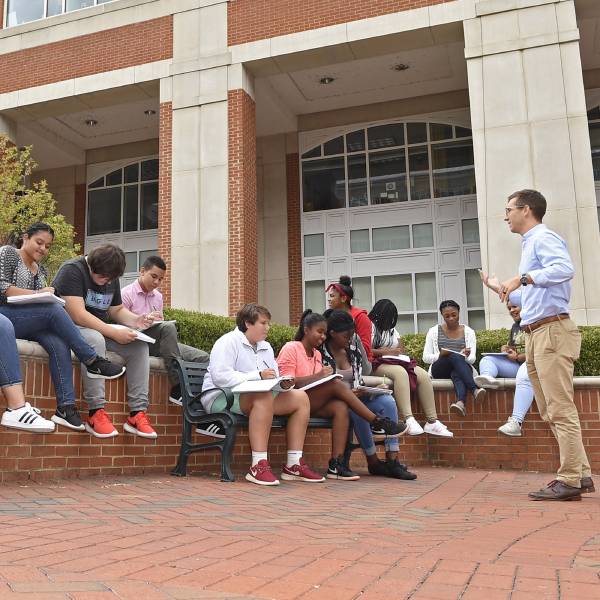
Students transferring to UNC Charlotte are a highly diverse group that makes up approximately 50 percent of the total undergraduate student population, the largest percentage among UNC System schools. In fall 2020, transfer students comprised nearly 40% of the new undergraduate students on a campus with an enrollment of more than 30,000.
Through the UNC Charlotte Transfer Center, the University provides support and resources for a seamless transition among transfer students. Additionally, UNC Charlotte partners with regional community colleges to ensure that transfer students have clear pathways and tailored advising from the beginning of their college journey. In addition, transfer credit policies and practices provide students every advantage possible regardless of where they started. The University recently added a 2+2 Transfer Program that allows transfer students to earn a Bachelor of Science in Data Science from UNC Charlotte’s School of Data Science, the only such school in the Carolinas.
In October 2019, UNC Charlotte introduced 49erNext, a co-admission program that maximizes transfer credit through the use of degree plans and regular data exchange, ensuring students’ progress toward timely completion of a baccalaureate degree. As participants in the 49erNext program, students are eligible to transfer into more than 75 undergraduate degree programs (130+ majors) at UNC Charlotte, as long as they earn an associate degree and meet minimum GPA requirements.
The 49erNext program includes partnerships with North Carolina’s two largest community colleges and will welcome its sixth partner in the fall of 2021.
Click here to learn more about UNC Charlotte’s transfer programs.

The University of North Texas (UNT), a top transfer institution and the school of choice for many transfer students living in both the greater Dallas-Fort Worth region and across Texas. In fall 2020, UNT welcomed more than 3,800 new transfer students along with another 1,630 in spring 2021.
Providing a guided transition that is as seamless and affordable as possible is key to ensuring that transfer students are successful in their college journey. The new Fast-Track Business Degree is an example of how UNT maximizes a student’s transfer credits to minimize the time and expense associated with earning a bachelor’s degree. This plan streamlines business prerequisite courses for students transferring with any completed associate’s degree and is part of the Education Design Lab’s Seamless Pathway projects.
Generous Transfer Excellence Scholarships that recognize perseverance and a proven academic track record also help make UNT more affordable for eligible students. And, because a significant number of these students want to transfer in the spring, UNT offers these scholarships both long terms.
In addition, knowing that students who transfer with more than 42 credit hours tend to be more successful in their quest for a bachelor’s degree, UNT offers a one-time $500 bonus award to Transfer Excellence Scholarship recipients who have earned an AA or AS degree from one of its local community college partners.
The bottom line—in 2020, UNT awarded bachelor’s degrees to 3,347 students who started as transfer students or 43% of all undergraduate degree recipients.
Click here to learn more about UNT’s financial aid programs for transfer students.
Virginia Commonwealth University (VCU)

Virginia Commonwealth University is committed to seeing every student succeed. This includes a growing population of adult learners and military students who often seek to transfer both traditional college course credit and credit for prior learning experiences in order to complete a bachelor’s degree.
In 2020, President Michael Rao formed advisory councils for adult and military student services to develop recommendations for improving transfer policies and expanding those services in support of these student populations. Because these students may need extra support to develop an efficient educational plan, VCU created a website for adult learners that connects students to various student support resources, including the Transfer Center and the Student Financial Management Center. Recognizing that adult learners and military students with transfer credit need individualized support, VCU already has an office of Military Student Services that coordinates services for military-affiliated students and has created an office of Adult and Non-Traditional Student Services that will open Fall 2021.
Among the advisory council recommendations was a proposal to award credit for military service and other prior learning experiences. In March 2021, VCU expanded credit for military training to include: CLEP and DSST exams scores and academic credit, up to six credits, for at least one year of U.S. military service. The university is also exploring the possibility of awarding credit for other forms of prior learning experiences and plans to expand transfer pathways to bachelor’s degree completion for students in applied associate degrees from Virginia community colleges.
Click here to learn more about VCU transfer programs.
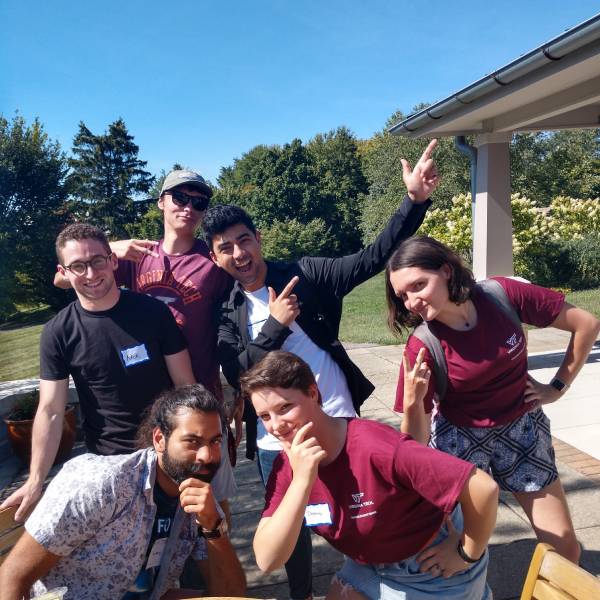
The Hokie Transfer Community (HTC) houses Virginia Tech’s transfer initiatives and programs: Transfer Experience Living Learning Program, Transfer Peer Mentor Program, National Transfer Student Week, as well as a transfer first semester transition course. The HTC provides students with free or low cost programs designed to enhance their onboarding process.
These programs provide transfers with holistic support, helping them develop connections with fellow Hokie transfers (new and current), and opportunities to get involved in the Virginia Tech community. The HTC also provides current transfer students with opportunities to live out “Ut Prosim,” Virginia Tech’s motto That I May Serve, through various leadership positions within each program.
The Hokie Transfer Community strives to make the transition for new incoming transfer students a seamless and positive experience, knowing this is the key moment for students to make that connection. The HTC has also seen the campus connection increase. Students that participate in HTC events tend to participate in other campus opportunities at a 10% higher rate than transfer students that do not participate in the HTC programs.
Click here to learn more about Virginia Tech’s transfer student programs.



Stay Connected
X (formerly Twitter)
Facebook
YouTube
LinkedIn
RSS